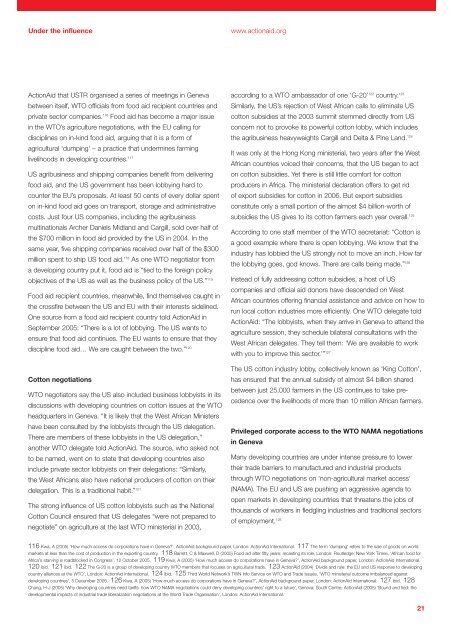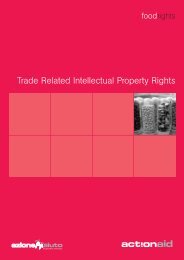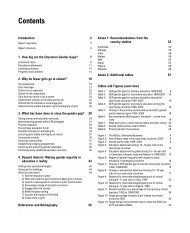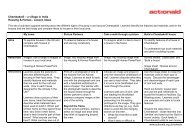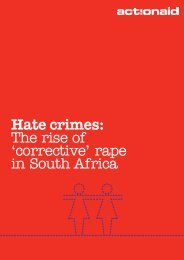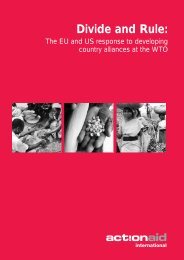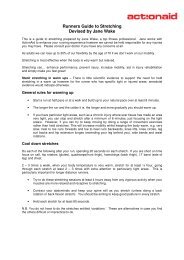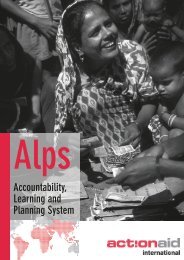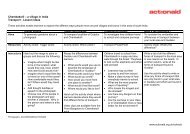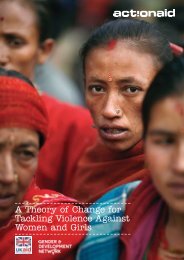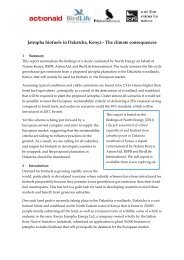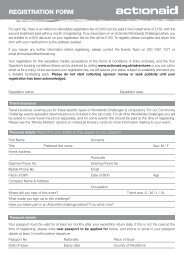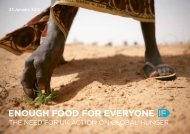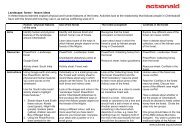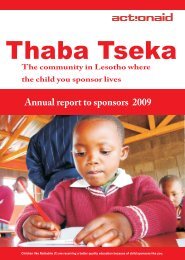UNDER THE INFLUENCE - ActionAid
UNDER THE INFLUENCE - ActionAid
UNDER THE INFLUENCE - ActionAid
Create successful ePaper yourself
Turn your PDF publications into a flip-book with our unique Google optimized e-Paper software.
Under the influence<br />
www.actionaid.org<br />
<strong>ActionAid</strong> that USTR organised a series of meetings in Geneva<br />
between itself, WTO officials from food aid recipient countries and<br />
private sector companies. 116 Food aid has become a major issue<br />
in the WTO’s agriculture negotiations, with the EU calling for<br />
disciplines on in-kind food aid, arguing that it is a form of<br />
agricultural ‘dumping’ – a practice that undermines farming<br />
livelihoods in developing countries. 117<br />
US agribusiness and shipping companies benefit from delivering<br />
food aid, and the US government has been lobbying hard to<br />
counter the EU’s proposals. At least 50 cents of every dollar spent<br />
on in-kind food aid goes on transport, storage and administrative<br />
costs. Just four US companies, including the agribusiness<br />
multinationals Archer Daniels Midland and Cargill, sold over half of<br />
the $700 million in food aid provided by the US in 2004. In the<br />
same year, five shipping companies received over half of the $300<br />
million spent to ship US food aid. 118 As one WTO negotiator from<br />
a developing country put it, food aid is “tied to the foreign policy<br />
objectives of the US as well as the business policy of the US.” 119<br />
Food aid recipient countries, meanwhile, find themselves caught in<br />
the crossfire between the US and EU with their interests sidelined.<br />
One source from a food aid recipient country told <strong>ActionAid</strong> in<br />
September 2005: “There is a lot of lobbying. The US wants to<br />
ensure that food aid continues. The EU wants to ensure that they<br />
discipline food aid… We are caught between the two.” 120<br />
Cotton negotiations<br />
WTO negotiators say the US also included business lobbyists in its<br />
discussions with developing countries on cotton issues at the WTO<br />
headquarters in Geneva. “It is likely that the West African Ministers<br />
have been consulted by the lobbyists through the US delegation.<br />
There are members of these lobbyists in the US delegation,”<br />
another WTO delegate told <strong>ActionAid</strong>. The source, who asked not<br />
to be named, went on to state that developing countries also<br />
include private sector lobbyists on their delegations: “Similarly,<br />
the West Africans also have national producers of cotton on their<br />
delegation. This is a traditional habit.” 121<br />
The strong influence of US cotton lobbyists such as the National<br />
Cotton Council ensured that US delegates “were not prepared to<br />
negotiate” on agriculture at the last WTO ministerial in 2003,<br />
according to a WTO ambassador of one ‘G-20’ 122 country. 123<br />
Similarly, the US’s rejection of West African calls to eliminate US<br />
cotton subsidies at the 2003 summit stemmed directly from US<br />
concern not to provoke its powerful cotton lobby, which includes<br />
the agribusiness heavyweights Cargill and Delta & Pine Land. 124<br />
It was only at the Hong Kong ministerial, two years after the West<br />
African countries voiced their concerns, that the US began to act<br />
on cotton subsidies. Yet there is still little comfort for cotton<br />
producers in Africa. The ministerial declaration offers to get rid<br />
of export subsidies for cotton in 2006. But export subsidies<br />
constitute only a small portion of the almost $4 billion-worth of<br />
subsidies the US gives to its cotton farmers each year overall. 125<br />
According to one staff member of the WTO secretariat: “Cotton is<br />
a good example where there is open lobbying. We know that the<br />
industry has lobbied the US strongly not to move an inch. How far<br />
the lobbying goes, god knows. There are calls being made.” 126<br />
Instead of fully addressing cotton subsidies, a host of US<br />
companies and official aid donors have descended on West<br />
African countries offering financial assistance and advice on how to<br />
run local cotton industries more efficiently. One WTO delegate told<br />
<strong>ActionAid</strong>: “The lobbyists, when they arrive in Geneva to attend the<br />
agriculture session, they schedule bilateral consultations with the<br />
West African delegates. They tell them: ‘We are available to work<br />
with you to improve this sector.’” 127<br />
The US cotton industry lobby, collectively known as ‘King Cotton’,<br />
has ensured that the annual subsidy of almost $4 billion shared<br />
between just 25,000 farmers in the US continues to take precedence<br />
over the livelihoods of more than 10 million African farmers.<br />
Privileged corporate access to the WTO NAMA negotiations<br />
in Geneva<br />
Many developing countries are under intense pressure to lower<br />
their trade barriers to manufactured and industrial products<br />
through WTO negotiations on ‘non-agricultural market access’<br />
(NAMA). The EU and US are pushing an aggressive agenda to<br />
open markets in developing countries that threatens the jobs of<br />
thousands of workers in fledgling industries and traditional sectors<br />
of employment. 128<br />
116 Kwa, A (2005) ‘How much access do corporations have in Geneva?’, <strong>ActionAid</strong> background paper, London: <strong>ActionAid</strong> International. 117 The term ‘dumping’ refers to the sale of goods on world<br />
markets at less than the cost of production in the exporting country. 118 Barrett, C & Maxwell, D (2005) Food aid after fifty years: recasting its role, London: Routledge; New York Times, ‘African food for<br />
Africa's starving is roadblocked in Congress’, 12 October 2005. 119 Kwa, A (2005) ‘How much access do corporations have in Geneva?’, <strong>ActionAid</strong> background paper, London: <strong>ActionAid</strong> International.<br />
120 ibid. 121 ibid. 122 The G-20 is a group of developing country WTO members that focuses on agricultural trade. 123 <strong>ActionAid</strong> (2004) ‘Divide and rule: the EU and US response to developing<br />
country alliances at the WTO’, London: <strong>ActionAid</strong> International. 124 ibid. 125 Third World Network’s TWN Info Service on WTO and Trade Issues, ‘WTO ministerial outcome imbalanced against<br />
developing countries’, 5 December 2005. 126 Kwa, A (2005) ‘How much access do corporations have in Geneva?’, <strong>ActionAid</strong> background paper, London: <strong>ActionAid</strong> International. 127 ibid. 128<br />
Chang, H-J (2005) ‘Why developing countries need tariffs: how WTO NAMA negotiations could deny developing countries’ right to a future’, Geneva: South Centre; <strong>ActionAid</strong> (2005) ‘Bound and tied: the<br />
developmental impacts of industrial trade liberalization negotiations at the World Trade Organisation’, London: <strong>ActionAid</strong> International.<br />
21


